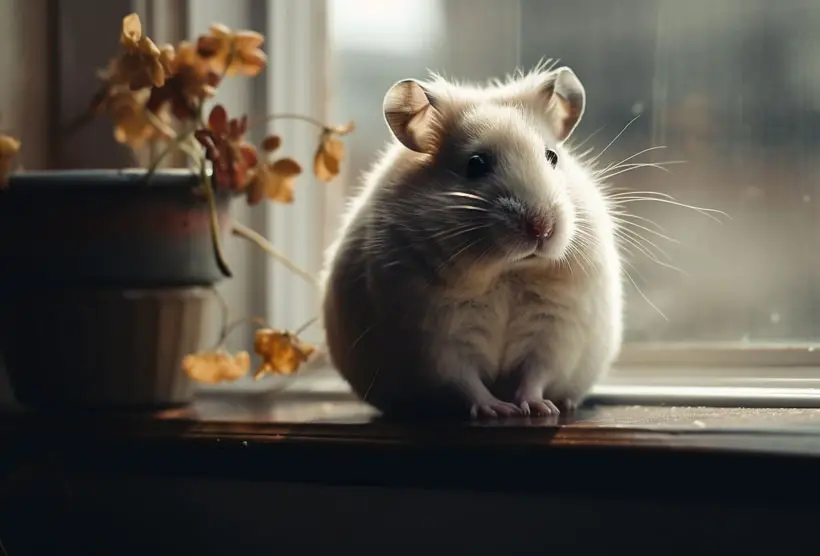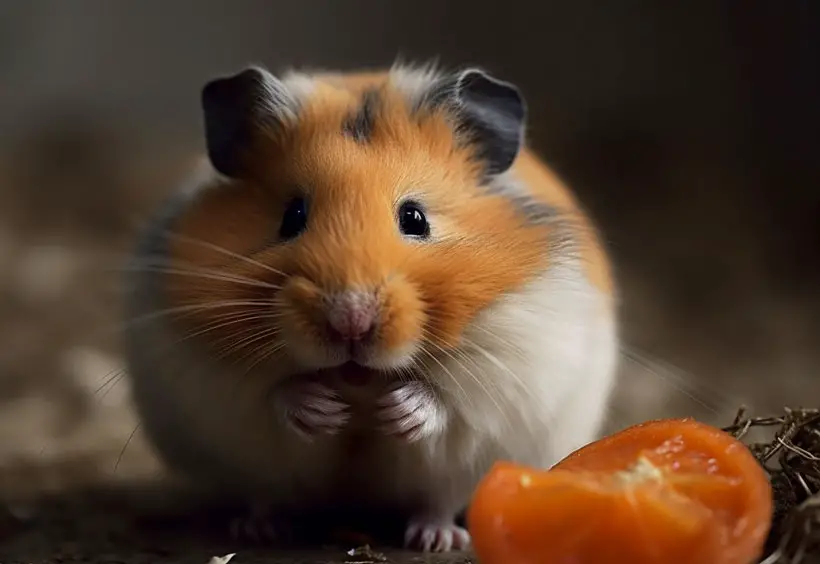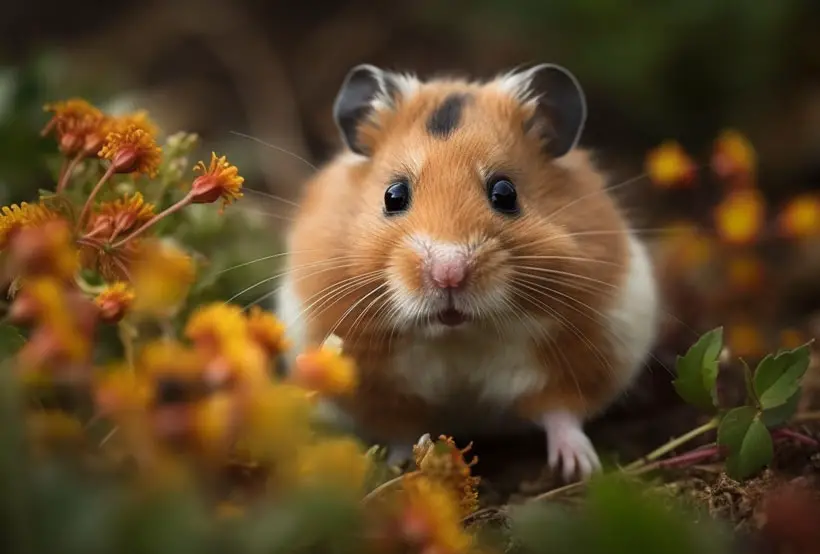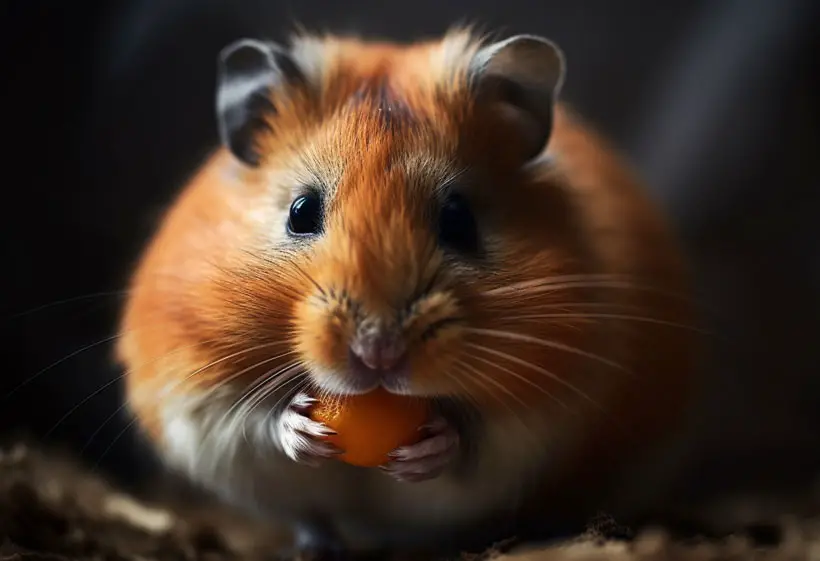Why Does My Throw Up Food : Causes and Solutions
When you notice chewed food inside your hammies’ cage, you might assume it’s been throwing up and having issues with digestion. The fun fact is that hamsters don’t vomit. They only throw up or spit out the food stored in their cheek pouches.
But why do hamsters throw up food? When the hamster suspects danger or becomes scared, it spits out food to run faster. This also happens when the hamster gets stressed or anxious. Lack of variation in the diet and getting introduced to a new environment are also two key reasons why your hamster is throwing up.
Let’s get into the details of why hamsters throw up and what to do if your hamster spits out food or refuses to eat at all. We will also discuss why hamsters cannot vomit and some related hazards.
Hamsters Throwing Up Food: Causes, Symptoms, and Solutions
Your hamster has two large pockets on each side of its mouth to store food. Typically, it saves the food items to eat later in a more comfortable position. When it throws up, you only see the chewed food mixed with saliva. Remember, once the food enters the digestive tract, there’s no coming back.

Here are the reasons why your hamster might be spitting out chewed food and some possible solutions.
Cause 1: The Hamster Was Attacked
Throwing up chewed food is a simple defense response in hamsters. When a hamster is attacked, it quickly spits out the food it was stored inside its cheek pouches. Escaping becomes a bit tough when your hamster’s mouth is full. So, it releases the extra weight to get ready for running away from the location.
If you have multiple pets at your house, one of them might have attacked the hamster. Little kids might also be held responsible for unintentional attacks.

What are the Symptoms?
If your hamster was attacked, you’d notice the following symptoms:
❖ Inappetence or anorexia
❖ Frequent breathing
❖ Restless behavior
❖ Bleeding
❖ Loud crying
❖ Limping
❖ Labored breathing
What’s the Solution?
Keep your hamster in a separate cage protected from other pets. Even if you take it out to play with it, be careful about not leaving it alone, especially if you have kids at home. In short, make sure no one can attack your little pet, as it will not only make the hamster throw up food but also cause injuries.
Cause 2: It Suspects Danger
Even if the hamster wasn’t attacked or injured, it might spit out food upon suspecting any type of danger. This can happen when someone approaches the little soul aggressively or makes a loud sound. If the hamster gets scared for some reason, it might throw up food and refuse to eat or drink.

What are the Symptoms?
When a hamster is scared, it might display the following signs:
❖ Hiding
❖ Biting and scratching
❖ Acting skittish
❖ Running restlessly
What’s the Solution?
Avoid doing things that might come across as aggressive.
❖ Simply spread your palms towards it to get familiar with it.
❖ Don’t hover your hands, making it look like you’re grabbing the hamster.
❖ Let the hamster slowly get introduced to new members of your family.
❖ Gently talk to it and avoid making loud sounds.
Cause 3: Your Pet Is Stressed or Nervous
A stressed hamster can consistently spit out food from their pouches. Just like humans, hamsters can also become nervous easily for a bunch of environmental factors. Rough handling, lack of proper hygiene, sudden movements, poor diet, etc., are some reasons why your little friend might be stressed.
Besides, if it’s affected by bacteria, viruses, or other parasite-related infections, it will show signs of stress and nervousness. Lack of physical activity can also make your pet nervous.

What are the Symptoms?
If your hamster becomes stressed or nervous, it will try to release the stress by being overly active. Here are the signs a stressed hamster will display:
❖ Excessive salivation
❖ Hyperactivity
❖ Making strange noises
❖ Hair loss
❖ Aggressiveness
❖ Compulsive behavior
What’s the Solution?
Be very gentle while handling your hamster. Clean its cage regularly and ensure a healthy diet. You must arrange some toys like wheels and balls to keep the hamster active.
Don’t take it too high, and avoid moving it roughly when it’s resting. Finally, check if the hamster has any type of pathological disease and contact your vet if necessary.
Cause 4: Moving To A New Environment
Some hamsters are not so good at socialization. So, if you’re trying to play with it right after bringing it home, you’ll make it nervous and scared. Even a simple touch can trigger the hamster and make it fearful for days.
As a result, the hamster will reject food and throw up when you try to touch it. This might also happen when you move your pet to a new cage or new house.

What are the Symptoms?
In this case, the hamster will show unusual behaviors such as:
❖ Climbing the cage
❖ Gnawing incessantly
❖ Turning on its back
❖ Biting things around its cage
❖ Tries to run away
What’s the Solution?
When you bring a new hamster at home, give it a few days to settle down. Avoid touching it at all during this period. First, make it familiar with your smell by letting it sniff your hands. After that, gently hold and lift it on your palms.
Talk to it and pet it while feeding it. Once the hamster is comfortable with petting, you can start holding it and moving around. This way, your hamster will start socializing and get used to the environment.
Cause 5: Lack of Food Variation
Your hamster can easily get bored of eating the same food every day. Even if it’s a healthy and nutritious diet, you need to bring variation to its daily meals. Otherwise, the hamster might refuse to eat or throw up after taking a bite.

What are the Symptoms?
Apart from throwing up, the hamster will refuse to eat if it doesn’t like the food.
What’s the Solution?
Mix different types of fruit and veggies to make the meal tasty, healthy, and appealing. Treat your hammer with dry foods like oats, seeds, and nuts so that it doesn’t get bored of eating only one type of food every day.
Why Don’t Hamsters Vomit?
A group of neuroscientists has found that hamsters lack gag or vomit response due to their anatomical structure. Features like a less muscular diaphragm, thin muscles under their lungs, a long esophagus, and a one-way digestive system are the reasons why hamsters are unable to vomit.

Besides, hamsters lack the brain neurons that produce the vomiting response against overeating. When hamsters throw up, they are only spitting out the food stored in their cheek pouches. These pockets can expand up to 20% of their original size. On some rare occasions, the hamster might gag or choke on food.
As hamsters don’t vomit, you must ensure your hamster takes measured food according to its age and body weight.
If you’re a hamster owner, you may have noticed that your pet occasionally regurgitates their food. At RodentsFact, we have an article on hamster throw up food that can help you understand this behavior and provide tips on how to prevent it. Additionally, if you want to build a stronger bond with your hamster, be sure to check out our article on how to get your hamster to like you. This article provides practical tips for building trust with your pet and fostering a positive relationship. And if you’re concerned about the health of your hamster, our article on is my hamster dying or hibernating can help you recognize the signs of illness or hibernation. By learning about these aspects of hamster care, you can provide the best living conditions for your pet and deepen your relationship with them.FAQs
Here are some questions and their answers that people want to know related to hamsters throwing food. You may go through them to know more about this issue.
1. Is it normal for hamsters to throw up their food?
Yes, it’s completely normal for hamsters to throw up food. It might spit out the food right after eating or go to a different location to release the food. However, if it’s consistently throwing up food and refusing to eat, you need to call your vet for expert suggestions.
2. How do I know if my hamster is over-eating?
If your hamster eats more than necessary, it won’t be able to throw up the extra food and will have an upset stomach. In most cases, the hamster will have diarrhea. Long-term effects of over-eating include weight gain, heart problems, and malnutrition.
3. How much food is too much for hamsters?
Hamsters don’t need more than two tablespoons of food per day. If you feed it more than that, it’s too much for the hamster, even if it’s an adult and hyperactive hamster. Besides, giving a similar kind of food for extended periods can also be considered too much and lead to health issues.
Wrapping Up!
In this guide, we’ve discussed all the possible reasons why your hamster might be spitting out food from their cheek pouches.
Remember, you don’t need to panic if your little pet is throwing up. It’s completely normal, and there is no special treatment for it. Let your little hammie relax for some time, and everything will be normal again.
However, if the issue sustains and your pet keeps throwing up for days, it might be a sign of some serious health problem. Take your hamster to your pet for a thorough check-up and the necessary treatment.





